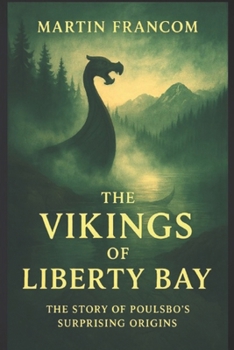The Vikings Of Liberty Bay: The Story Of Poulsbo's Surprising Origins
Book Review: The Vikings of Liberty Bay: The Story of Poulsbo's Surprising Origins
Rating: ⭐⭐⭐⭐1/2 (4.5/5 stars) By Gemini Book Reviews
A Masterful Exploration Cultural and Historical Myth-Making
"The Vikings of Liberty Bay" is that rare historical novel that manages to be both intimately personal and sweepingly epic, tracing the complex origins of Poulsbo, Washington through the lens of one family's multi-generational journey. What begins as a seemingly straightforward tale of Norwegian settlement transforms into a profound meditation on how communities create and sustain their cultural identities.
The novel's protagonist, Ole Stubb, arrives in the Pacific Northwest in 1875 obsessed with proving that Viking explorers reached these shores centuries before Columbus. The author's greatest achievement is showing how Ole's quest-initially driven by academic obsession-evolves into something far more meaningful: the foundation of a genuinely multicultural community. His marriage to Kaaxkwei, a Tlingit-Haida woman, creates not just a family but a bridge between worlds that would otherwise remain separate.
The story's central conceit-that Poulsbo's Viking identity originated in a tactical deception to prevent conflict-is handled with remarkable nuance. Rather than exposing this origin story as mere cynical manipulation, author demonstrates how practical necessity can evolve into authentic cultural expression. The "Viking ghosts" that begin as intimidation tactics eventually become the foundation for a genuine community tradition, raising fascinating questions about the nature of cultural authenticity itself.
The stories prose is elegant without being overwrought, and his character development is exceptional. Ole's transformation from obsessed scholar to community elder feels entirely natural, while Kaaxkwei emerges as the story's moral center, navigating between cultures with wisdom and pragmatism. Their children-particularly the intellectually rigorous Astrid and the seafaring Erik-carry the family legacy forward in ways that feel both inevitable and surprising.
The novel's structure, spanning from 1874 to the present day, is ambitious but well-executed. Each time period feels authentically rendered, from frontier hardships to the complexities of wartime identity. Francom shows particular skill in depicting how historical events (economic depressions, world wars, cultural movements) reshape community identity without sacrificing the intimate human drama at the story's heart.
Where the novel occasionally falters is in its final chapters, where the academic discussions of cultural theory sometimes overwhelm the narrative momentum. The transition to multiple perspectives in the epilogue, while thematically appropriate, lacks some of the emotional weight of the earlier, more tightly focused chapters.
That said, "The Vikings of Liberty Bay" succeeds brilliantly as both entertainment and contemplation. It's a book that will satisfy readers looking for historical fiction, family saga, and cultural commentary alike. Most impressively, it avoids the trap of either romanticizing or cynically dismissing invented traditions, instead presenting them as a natural part of how communities create meaning from their past.
At its heart, this is a story about the power of stories themselves-how they evolve, how they bind communities together, and how they transform over time. The author has created a work that honors the complexity of American identity while telling a deeply engaging human story. It's the kind of novel that will reward multiple readings, revealing new layers each time.





